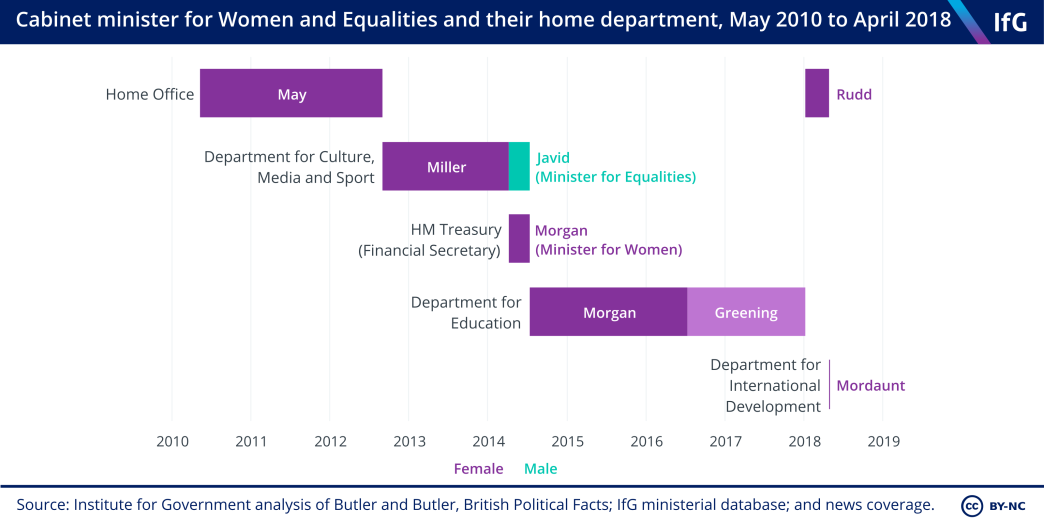Creating a more equal society requires political drive from the very top
The disruption caused by turnover at the top suggests the equalities agenda isn’t at the heart of the government’s mission.
MPs are calling for a shake-up of the Minister for Women and Equalities role. Gavin Freeguard says that when it comes to equalities, government actions have spoken louder than the Prime Minister’s words.
I recently gave evidence to the Women and Equalities select committee on the role of the Minister for Women and Equalities and the Government Equalities Office (GEO). In my session, I explained how changing ministers and moving civil servants is disruptive to getting things done in government.
The committee has since published a report with realistic proposals for the structures that need to be put in place to create a more equal society. But ultimately, any recommendations will succeed or fail according to the political priority the government is willing to give to equalities policy.
Government actions speak louder than the Prime Minister’s words
Theresa May put equality at the heart of her first speech as Prime Minister. She talked about the ‘burning injustices’ around gender balance, ethnicity and socio-economic backgrounds. The Government has since taken some positive steps, including the race disparity audit published in October 2017.
But the disruption caused by turnover at the top suggests the equalities agenda isn’t at the heart of the government’s mission. When Penny Mordaunt succeeded Amber Rudd as Minister for Women and Equalities, she became the seventh minister to hold the role since 2010. This is more turnover than with any other Cabinet position.

Constant change in ministers is disruptive anywhere, but equalities suffers more than other departments for two other reasons.
The first, as the committee highlights, is the job being allocated as an “afterthought”, “motivated not by any strategic purpose but by unconnected changes in ministerial personnel”, given part-time to a female Cabinet minister.
The second challenge is that staff have moved between eight different departments since the Minister for Women was introduced in 1997. The Minister now sits in in one department (DfID), the junior ministers in another (the Home Office), and the civil servants of the GEO in a third (the Department for Education). Moving civil servants and working across different departments around creates practical difficulties and takes time. But more importantly, it leads to the civil society groups working with the department, others in government and the public more widely not taking equalities seriously.
The committee’s recommendations on strategy and structure would provide stability and clarity
The committee wants the GEO to sit at the centre of government – in the Cabinet Office. From there, the GEO could drive a cross-government strategy and use a Cabinet sub-committee to hold departments’ feet to the fire.
There are some risks in basing a full-time minister in the Cabinet Office – they may be seen as junior and have little clout across Whitehall. But while the more senior figures who have so far held the brief might have more clout, they also have little time to focus on the equalities aspect of their job.
So in the Cabinet Office, the Minister for Women and Equalities could “find a long-term home”, while junior ministers split between their equalities brief at the Cabinet Office and a complementary role in another department.
A strategy would clear up the current confusion over the GEO’s responsibilities, clarify what government wants to achieve and allow the committee and others to hold the GEO and its ministers to account for achieving their goals, or not.
We need a change of mentality from government
As much as structures matter, there is also the question of political will. The way responsibility for equalities has been shuffled around Whitehall with a succession of different ministers suggests Prime Ministers have not taken it seriously as a crucial cross-cutting brief, but a title appended as an afterthought to a senior female minister who already has a department to run.
As the committee says, the most important thing is that the equalities makes “an impact within Whitehall and therefore within the lives of people in the UK”. This support means resources, ministerial time and authority – which ultimately comes from the very top.
- Topic
- Ministers
- Keywords
- Machinery of government Select committees
- Department
- Government Equalities Office Cabinet Office
- Publisher
- Institute for Government